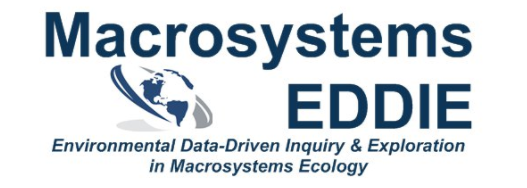Our focus is to build a diverse community of individuals who are 1) trained on the methods, theory and decision science to create iterative near-term forecasts, or 2) trained to use the forecast predictions in management and policy. The Education and Diversity & Inclusion are separate working groups, but work closely together with a focus on building an inclusive community of practice among ecological forecasting educators and developing open, collaborative, and extensible teaching materials at the undergraduate, graduate, and professional levels. We think training in ecological forecasting is important for all ecologists, not just those actively building forecasts. For example, the approaches used to design experiments and collect data can change nontrivially if we want to inform predictions.
Education Working Group Schedule of Calls:
The Education Group will meet on Fridays at noon US Eastern on June 28, July 19, and August 16. A new schedule of calls will be developed for September to December 2024. We are always open to people joining the calls, contact us at eco4cast.initiative@gmail.com
Education Resources
Publications
Paper on Ethics in Forecasting Educational Modules was published in both Teaching Issues and Experiments in Ecology and as a QUBES Open Educational Resource. This allows us to reach a broader audience. A DOI is available with the QUBES publication. Here are the two citations:
- Lewis, A.S.L., D.W. Howard, G. Koren, C. Kowalski, J. McLachlan, J.A. Peters, G. Smies, and O. Tabares. 2023. Ethics in ecological forecasting: four case-based teaching modules. Teaching Issues and Experiments in Ecology, Vol. 19: Practice #13. https://tiee.esa.org/vol/v19/issues/case_studies/lewis/abstract.html
- Lewis, A. S., Howard, D. W., Koren, G., Kowalski, C., McLachlan, J., Peters, J., Smies, G., Tabares, O. (2024). Ethics in ecological forecasting: four case-based teaching modules. EFI-RCN: Ecological Forecasting Initiative Research Coordination Network, QUBES Educational Resources. doi:10.25334/5D99-Y019
Module topics from the ethics paper
- Module 1: Flying foxes and uncertainty
- Module 2: Marine Fisheries and conflicts of interest
- Module 3: Water Quality and Indigenous Knowledge
- Module 4: Tropical forests and data availability
Willson, A. M., H. Gallo, J.A. Peters, A. Abeyta, N. Bueno Watts, C.C. Carey, T.N. Moore, G. Smies, R.Q. Thomas, W.M. Woelmer & J.S. McLachlan. 2023. Assessing opportunities and inequities in undergraduate ecological forecasting education. Ecology and Evolution, 13, e10001. https://doi.org/10.1002/ece3.10001

Teaching Ecological Forecasting in Your Class!
Are you looking for fresh curriculum ideas? Consider including a one to three-hour active learning module on ecological forecasting that allows students to explore key forecasting concepts using real environmental data. The materials in the modules are in an RShiny format that introduces the concepts and gives hands-on applications for what is taught. Students can save their progress in the RShiny app so they do not need to complete the materials in one sitting. Modules 6 and 7 are also available in an RMarkdown format for students with coding experience. This allows instructors who want to go a step further with their instruction to allow the students to understand and apply the code to new situations.
1) Module 5: Introduction to Ecological Forecasting (link to the module; link to the instructor materials)
2) Module 6: Understanding Uncertainty in Ecological Forecasts (link to the module; link to the instructor materials; link to the Rmarkdown material)
3) Module 7: Using Data to Improve Ecological Forecasts (link to the module; link to the instructor materials; link to the Rmarkdown material)
4) Module 8: Using Ecological Forecasts to Guide Decision Making (link to the module; link to the instructor materials)
These modules are part of the Macrosystems EDDIE series funded by the NSF Macrosystems Biology program. Each module uses NEON data to teach key forecasting concepts.
If you are interested in teaching these modules in your class, email Mary Lofton (melofton@vt.edu) or Cayelan Carey (cayelan@vt.edu).
Go the Educational Resources Page to get
- Materials from Ecological Forecasting Courses & Workshops
- A compiled list of over one hundred educational resources related to Ecological Forecasting
- A compiled list of articles, papers, and websites related to using AI in the classroom
- 2-page pdf overview of what ecological forecasting is and potential careers as well as examples of courses that is a starting point for students to learn more about the concepts and statistical and computational tools used in ecological forecasting
- Infographics to support teaching and learning biostats in R
- Example syllabi for ecological forecasting courses
Notes from Working Group Calls
Chair: Jason McLachlan (University of Notre Dame)
- May 10, 2024
- April 12, 2024
- March 8, 2024
- February 9, 2024
- January 12, 2024
- December 4, 2023
- November 6, 2023
- October 2, 2023
- September 11, 2023
- August 17, 2023
- July 13, 2023
- June 15, 2023
- May 11, 2023
- April 13, 2023
- March 16, 2023
- February 9, 2023
- January 12, 2023
- December 5, 2022
- November 7, 2022
- October 10, 2022
- September 12, 2022
- August 10, 2022
- July 13, 2022
- June 15, 2022
- May 4, 2022
- April 6, 2022
- March 9, 2022
- February 9, 2022
- January 12, 2022
- November 18, 2021
- October 14, 2021
- September 16, 2021
- August 18, 2021
- July 14, 2021
- June 16, 2021
- May 10, 2021
- April 19, 2021
- March 29, 2021
- March 1, 2021
- February 1, 2021
- December 14, 2021
- November 16, 2021
- October 12, 2020
- September 14, 2020
- August 19, 2020
- July 22, 2020
- June 24, 2020
- May 27, 2020
- April 20, 2020
- April 13, 2020
- March 16, 2020
- February 17, 2020
- December 4, 2019
- October 16, 2019
- September 17, 2019 – joint DEI and Education Working Group call
- July 12, 2019 – joint DEI and Education Working Group call
